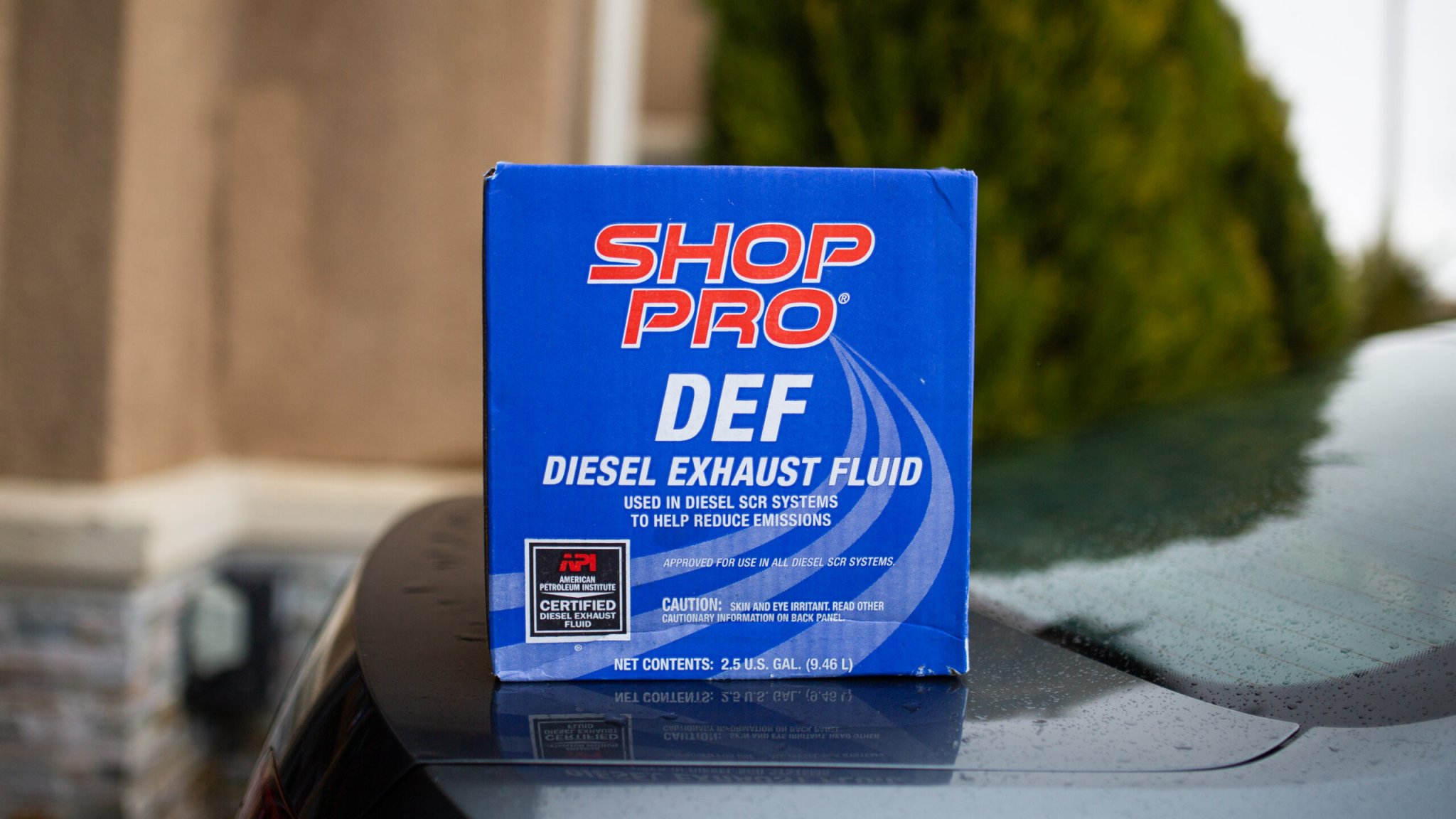

We may earn revenue from the products available on this page and participate in affiliate programs. Learn more ›
Emissions and pollution have all but defined the current landscape of the automobile. And since 1975, with the introduction of the Clean Air Act, cleaner burning engines have been priority number one. Manufacturers have tried a wide variety of technologies to try to keep tailpipe emissions down, most notably the ever-critical catalytic converter that we covered previously. But diesel cars have a special, almost fake-sounding liquid that helps them burn clean: diesel exhaust fluid.
Yes, diesel exhaust fluid (DEF) is real. But what does it do? How does it clean a diesel exhaust?
Almost every modern diesel engine, especially post-Dieselgate, is equipped with a selective catalytic reduction (SCR) system that injects DEF into the exhaust. It’s a crucial piece of emissions equipment that is highly frowned upon to remove in most states. It’s a highly specialized bit of gear, but there are several great reasons why modern diesel engines use SCR and DEF to stay clean.
Here’s how it all works.
Diesel Exhaust Fluid Cleans The Air
Diesel engines are filthy things, and the illusion of “clean diesel” was shattered once Volkswagen’s emissions cheating came to light in 2015. The increased scrutiny prompted research into the real environmental cost of diesel engines which, as it turns out, even if diesel engines were relatively clean of carbon dioxide (CO2), there would still be significant soot and NOx emissions.
Diesels can be made relatively clean, but they require much more expensive technology to stay clean.

DEF works largely like a chemical catalytic converter, as it is injected into the exhaust of a diesel engine at a strategic point to reduce certain harmful pollutants. It doesn’t react with all of the byproducts of combustion in the exhaust, but it does react with the most harmful emissions from diesel engines: oxides of nitrogen, better known as NOx.
DEF is made up of 32.5% urea and 67.5% deionized water. Urea is actually an organic compound made up of synthesized inorganic chemicals, and it turns into ammonia with heat. This is where an SCR system comes in because DEF is almost always paired with a specialized type of catalytic converter. It’s largely the same idea, just with a different blend of normal and precious metals. This is usually paired with a particulate filter before the catalyst to clean out the soot and large stuff that is a byproduct of diesel combustion.


Finally, the DEF is injected before the catalyst, and sometimes onto the catalyst. The car decides how much DEF to inject based on load, which then turns to ammonia in the hot exhaust. The ammonia reacts with the NOx in the exhaust, which is then continued into the catalyst. Through it, all the filthy NOx and ammonia is diluted and come out of the tailpipe as a harmless combination of water and nitrogen.
Why Diesel Exhaust Fluid Is Necessary
Clean air is a huge priority for public health. There was a time not long ago when there were smog days at major cities and much higher rates of respiratory disease due to smog. Hell, we used to put lead in fuel, which we then burned and emitted into the atmosphere, which is proven to cause harm to human cognition and general health.
DEF is just another step toward slowly scrubbing the air clean of pollutants, meaning we can all breathe easier.

And let’s face it: diesel is dirty. It needs all of the technologies we use today to make them viable, non-coal rolling engines for heavy industry and light trucks. They used to be a slight rarity in passenger cars, but they are widely used in trucking. Cleaning those emissions up is imperative. DEF, SCR, and particulate filters do an excellent job of making incredibly dirty diesels quite a lot less harmful to us and the environment.
But You Do Need To Fill Up
There are some downsides to DEF, however. The fluid itself is relatively expensive at around $6 per gallon, but trucks generally go hundreds of miles per gallon of DEF. Passenger cars can go a thousand miles or more on a gallon of DEF. It is an extra cost, but it is at a much lower frequency than fuel.

But with modern emissions controls, most diesels will refuse to start without DEF. If you run out on the road, most vehicles will enter limp-home mode until you can fill it with more, then refuse to restart after shutting off. Thus, it is imperative to keep filling the tank as necessary, and topping off for any long road trips.
Can You Repair Your DEF System At Home?
So you’ve found out that your DEF system is broken and want to know if you can fix it in your garage? Well, it depends, but generally not. The parts that comprise an SCR system and DEF injection are expensive and often require specialist terminals to access the ECU for repair and calibration. It is some of the most expensive equipment that comes on a diesel engine, and its locked down tight to prevent tampering. Repairing anything with DEF usually requires dealer-level software or a trip to a local dealer.
You can, however, fill up yourself.
More from The Drive
- Hank O’Hop highlights the best TPMS tools
- Let’s discuss how to buff a car
- Swapping a limited-slip differential into my BMW 128i was a brilliant decision
- Chris Rosales gives us a thorough review of the Michelin Pilot Sport Cup 2 Connect
